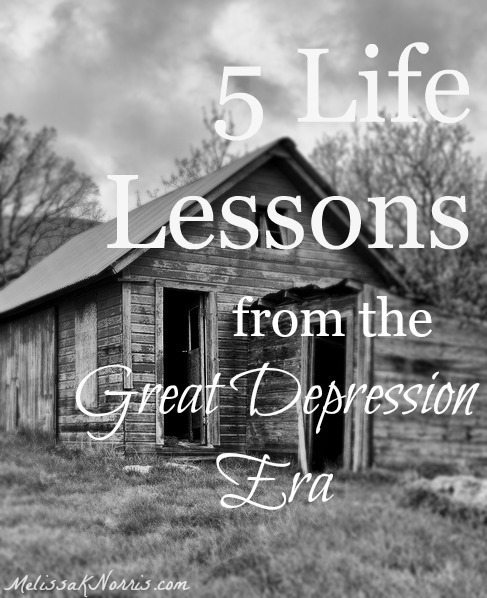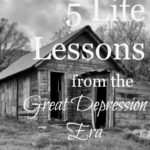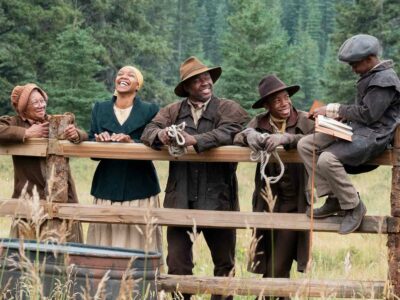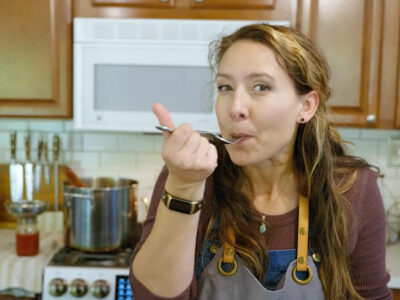Welcome! If you're like me, we want to learn what we can from those who went before us. In this post, I'm sharing the five life lessons we can all learn from the Great Depression.
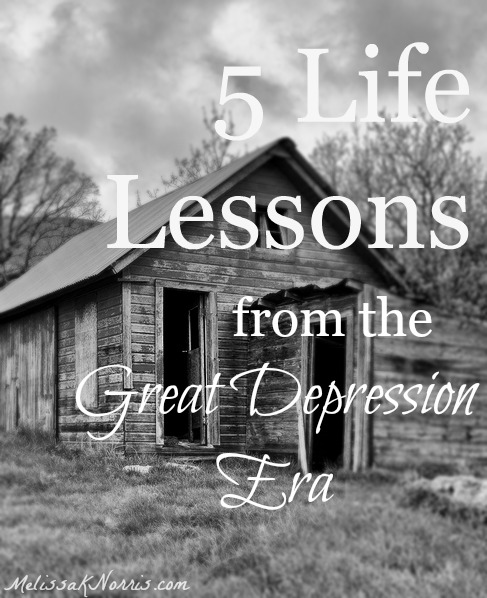
You want to:
- Save money
- Preserve traditional skills
- Hear the stories of those who overcame
- Become more self-sufficient
- Get back to the basics
We have a way of preserving those traditions and those skills so they’re not lost and we can pass them on to our kids and future generations. I think it’s really important.
Listen to this post (just push play below) and all our episodes of the
Pioneering Today Podcast while you're on the go, scrubbing the house, cooking up dinner (can I get an invite?), or mucking out stalls! I post new episodes Friday mornings. You can subscribe via RSS and receive every episode for free.![]()
Or subscribe via Itunes
Today’s episode is a really interesting story of how it came to me. I’m excited to share this story with you and I’m also excited you’re gonna want to stay through until the end because I have kind of a big surprise and I cant wait to share it with you because you guys are going to be a part of it. I’m really excited with that, so that’s my little teaser, right there.
I shared on my Facebook page, its been a couple of weeks back but it was a really cool video.
Check out the video and comments here–> Mountain People
It was filmed, I think it looked to be about from the 1970s. It was a documentation of the elderly people in the Apalachians. I’m assuming in the Tennesee, North Carolina area, that area of the United States.
It was just documenting their way of life. Keep in mind this was filmed in the 1970s and they were saying, you know, how fast paced the world is and how different it is but how much did they cherish it. They were showing what they did then. We have came forward so many years, I mean, we’re so much fast paced than they were.
1. Raise Your Own Food
It was really an interesting clip, a glimpse of looking back, and it was, there was so much interaction on the Facebook page with people talking about it, and how neat it was and how cool it was to see it. I thought it was really interesting to see some of the things that they said. And it really resonated with me and with the rest of my Facebook people. So one of the tips they had, and that they said is they raised practically everything that they ate, they raised themselves. One of the ladies that they interviewed in this video, in this Youtube clip. She was in her 70s, and she was still doing all of the farm chores, all of the raising, and the canning, and the cooking. She was still doing it in her 70s, you guys, by herself.
She was running her farm, she running her homestead…which is amazing! She was talking and sharing her insights like, so cool.
2. Relationships Matter
But one of the things, I noticed that a lot of them kept repeating or with the same sentiment but is just said in different words is how much that they enjoyed their relationships. I mean, the work is hard. Because it is when you are raising your own food, I think, a lot of times we tend to romanticize the home-setting way of life, for the pioneering way of life.
Even of what they went through during the Great Depression, sometimes you look at how they learned how to be so frugal, and they did. It was out of necessity. It was out of “had to”. But what I find interesting, I don’t want to romanticize that, like it’s super easy and it’s all this feels of butterflies and you know, that kid of thing. It is hard work.
On the other hand, like I said my dad was raised during the Great Depression, and he wouldn't trade that. He was raised on a home where they didn’t have running water, and they didn’t have indoor plumbing. They didn’t have electricity until he was a teenager and actually moved out of what we call the homestead. They moved across the creek. This sounds so funny, they actually cross the creek to get to the old home place, which is still there. But you drive across the creek, and then, they moved in to a neighborhood over on the road which is where I still live on the same road that my dad moved to as a teenager.
3. Hard Work Has its Blessings
I was born and raised and I have never lived off of the road that I lived on. So, anyways, I have really deep root here. But, the people that have went through that, my dad’s 78, what I noticed a lot in what they say of those that went through the Great Depression or that went to really hard times or have been truly self-sufficient as in they didn’t have money either by circumstances or they didn’t buy their food from the store by choice because they raised it all themselves — is they don’t talk about it as a bad thing. There’s no denying that, there’s no sugarcoating that but they talk about it. They wouldn’t trade that time, they wouldn’t trade it that circumstances, and they wouldn’t trade that work and the value that they get, the satisfaction that they get of putting the work in and growing it themselves.
They wouldn’t trade that. And I find that very, very interesting. And I think it’s pretty amazing!
The other thing that I was talking about was the relationships. How they had the elderly generation in this video, mainly they were probably in there 70s and 60s. Most of the folks they were interviewing this time and they were also interviewing their grand kids. Kids are probably about 6 or 7 and, in their teenage years and they were talking to them and getting their perspective on their grandparents. And the grandparents were talking.
What I really loved to hear, it was talking about is relationships – the relationships between people. The homesteading way of life and self-sufficiency, when you do it together as a family, it creates a bond.
This weekend we went out as a family we don’t have sugar maple syrup where we lived Pacific North West, but we have regular maple trees. And, so at the time of this recording of this Podcast, it is in February. so we are doing, the very first year that we were able to tap trees. We have tapped our Maple trees to try and get some syrup. So, I’m really excited, I love to learn and try on new things and doing self-sufficiency things and we went out as a family to tap the trees.
We were all out on the woods and my kids were climbing up in the different maple trees and handing us things as were drilling and tapping, and we have the hoses, and jugs and all of that stuff. We set 6 taps to the trees, but we did it as a family and it was a great excursion.
We were talking about why this tree; why you tapped this kind of tree, and why we’re doing it this time of the year, and what sap is and how you get it out, and how you turn it to syrup. It was like a whole like mini-home schooling lesson.
4. Creating Lasting Family Bonds
We were out there working and doing this stuff together as a family. You do not get that when you purchase it off at a grocery store shelf. So, I know when you’re listening to this and if you view those videos, and you’re like me and you want to bring more of that to your family and about the relationships and that’s really where what boils down to it, is what they were talking about is the relationships and passing this skills down to the younger generation and it just resonate with me. I’m like, oh my goodness, “Yes, this is it!”
I wanted to share with you a couple more things. In this first video that I’m talking about, the mountain people video. There was a clip and there was an older gal, (so, cool guys!). She was going to her root seller, and the shelves just lined with home canned goods, which, you all know, I love mason jars and canning.
She had cans on the top of the shelf and she was naming it this is the preserves, usually your fruit, you know, jams and jellies and spreads, they’re called preserves. She showed the canned beets, home canned green beans and home canned sauerkraut. She’s mentioning all of this things by name and keep in mind she has a Southern accent, but you can read the caption on most of the things that they were saying, and she points to a couple of jars, and this like a great debate had exploded on the post…so much fun!
If you're like me, you have a love of old-fashioned things. You want to preserve the old ways of life for future generations and believe the simple things in life matter.
You're in the right place if:
- Rows of Mason jars filled with homegrowns make your heart swell with pride
- Saving money by putting up your own food is high on your to do list
- Finding a new canning recipe makes your day
Listen to this post (just push play below) and all our episodes of the
Pioneering Today Podcast while you're on the go, scrubbing the house, cooking up dinner (can I get an invite?), or mucking out stalls! I post new episodes Friday mornings. You can subscribe via RSS and receive every episode for free.![]()
Or subscribe via Itunes
[powerpress]
Check out the video and comments here–> Mountain People
And so she points to one jar and she said, “this is my crep” C-R-E-P. Then she points to another jar, and she said, “this is my crout”, looks like a sauerkraut , and then she points to another jar, this is my tomato crep, again that’s C-R-E-P.
There’s a huge debate saying, no she’s really just saying Kraut for all of it and we are just misinterpreting her accent and somebody typed it wrong and we were doing all this Google searching. I searched, for some fun, WHAT IS TOMATO CREP?
This video had a lot of views and a lot of people wanted to know what is crep. When I did a Google search and a couple of other gals were also doing Google searches, and we could find post where people asked “Does anybody know what Tomato Crep is?” or “what is Tomato Crep” or “what is Crep from this video” but there was no answer.
Keeping Old Time Ways Alive
There’s this danger of things being lost. This was from the 1970s and here we are now and nobody knows what this is, and I look into my different canning books that I have and I wasn’t coming up with anything. I even looked up “on how to say soup in different languages” and that kind of thing, trying to see if I could find out if that’s slang for a different language. I couldn’t find anything.
Here’s where the really cool part gets in. In the town that I work in we have some people from, we call it, Tarheel. My dad’s from North Carolina and a lot of people here came out to work in the woods when the great Smokey Mountains became a national park then dropped the logging jobs that were available then. We have a lot of transplant Southerners. Because this woods opened up and there were experienced loggers. They were hard workers, and they migrated out here for the jobs in the woods. There’s a lot people from North Carolina and Tenesee here in Pacific North West where I live. That’s why my grandparents came out in the 1940s.
We have to have that relationship with the older generations. There’s so much vast knowledge there that it’s gonna be lost if we are not documenting it and not spending time with them and this is such a busy, hurry-up world that we don’t take the time… I’m talking about myself here to…we don’t take the time to engage with people and visit like we just do things hands-on with them like we used to.
The second video I found was Great Depression Cooking with Clara, who was 94-years-old when the video was filmed. I realized that most of the videos were from a couple of years ago and so I got to go on her channel and she has since passed away but all of her videos are still up their. Her grandson has left them all up, you know, it’s more of a tribute and it’s great information.
Like I’ve said I have never met her before, but I was so sad. I would have love to just sat and visit with her like that information and the knowledge that she has was so amazing which then, it dawned on me y’all. Oh my goodness, she’s so my dad.
My dad is 78 years old and he was born in the 1930s. He was raised on the time of Great Depression and he, like I’ve said they lived that lifestyle, they have no electricity, they have no running water they didn’t have an indoor bathroom, no refrigerator, I mean all of that. He grew up like that. He only went to school through the 10th grade. He was a self-made man. He had his own logging business and who has always raised cattle and raised a lot of our own food.
He’s got all that knowledge and I’m lucky now that I get to talk to him if I have a question, I can come up, maybe something like about cows. “Hey dad, what happens when you do this. Or what do I need to watch for this.” Just all of that kind of stuff, or hey how did grandma do this, or how did she used to do this back then.
He’s like my source, but why am I not sharing him with everybody. Like, why am I not filming this stuff and putting it up on Youtube? So everybody can watch and learn from him. Learn this, not just second hand from me, but learn it first hand from him, through him. I’m gonna hear his voice and his stories, and I am so excited, you could tell that by this.
Q&A Session with my father from the Great Depression
So, I asked him, because he’s very private. I mean, he likes to talk but, he does not know the Internet. He does not have E-mail. I don’t even know if he has even been on a computer, no joke, he does not do that kind of stuff. So, I asked him if he would be a guest on the Podcast and let me record him. And he didn’t say NO, which means YES. If he doesn’t say no, he means yes. I am so excited so I want you my awesome listeners and my readers to email me in…you could hit me up on my Facebook page , Instagram or Twitter with your questions for him or email me at [email protected] (Put Great Depression Era Question in the subject line)
I am super, super, super excited. So send me in your questions and he’s gonna be live on Podcast. I’m hoping I could film that too, and post it on Youtube so for you to be able to see him and I’m hoping we’ll have more questions come in, and we’ll have enough material to do several podcast and series with him.
Verse of the Week
I thought this verse is so fitting when we’re talking about the way the world is changing and preserving the things weren’t and focusing on the things, not just being busy but focusing on relationships and working with one another.
Do not be conformed to this world, this age, fashioned after and adapted to its external, superficial customs, but be transformed be changed by the entire renewal of your mind by its new ideals and its new attitude, so that you may prove for yourselves what is the good and acceptable and perfect will of God, even the thing which is good and acceptable and perfect in His sight for you. Romans 12:2 Amplified Version
I think that’s why so many of us really like to look back at the ways things used to be. I don’t know with you guys, but for me, when I look at the way that the world is going. First of all, God is still in control, He is still on the throne, so I try not get too caught up in all the bad stuff that we tend to see on the news and tends to talked about as much. I try not to focus on that and to just focus on the good because what we choose to focus on it tends to be what we see, so if we are continually praising and thanking God we tend to see the good in people and the good in situations and the good in life.
But when we complain, we focus on the negative then that becomes where our focus is, and that’s what we see. I try to just look for the good, look for His hands in everything.
When we look at the modern society we are going down the path opposite on what the Bible teaches. And that’s what I follow is the Bible, the Holy Bible. That’s were my faith comes from and that’s where I take everything back to Scripture. Cuz that’s what we have to do for ourselves, we can listen to pastors and preachers, and all that, and I think that’s great. But whatever they’re preaching or talking on if we don’t have Scriptural background ourselves, then that’s where things can get dangerous.
We need to be in Scripture for ourselves and to know what the Scripture says to be able to trust and know if that’s the truth.
I think that, when we talk about external superficial customs that tends to be a lot of what we see. You know there is something about when you step back and we slow down.
I tell you what, when you’re raising food, you’re growing your garden and you’re doing all of that, you have to tend it. And that makes you slow down and you’re out in the things that God created, you’re out in nature which He created and you see His hand because we cant do what he did. You watch the seed that you plant on the ground, and you watch it grow, and you have to weed it, and you have to tend it. Then you watch it fruit and you watch it harvest.
Suddenly, parables in the Bible they take on a whole new meaning and a whole new depth because you see when you got your grape vines, when you have your fruit trees it just brings it to a whole new level because you know it happens when you have to prune like you know the benefit that it does to the plant, when you see that true, that metaphor, in the physical sense. And you start to see it in your own life, and you get this revelations, it’s just really amazing.
There is something about the homesteading way of life that I see a lot of correlation, and I see God’s hand and a lot more when I’m doing that. Not that God can’t be anywhere and can’t use any situation to talk to us because He’s always with us, that’s not what I’m saying. Like if I’m my town, or I’m in my car, or I’m at my day job. I work as a pharmacy tech. I’m using the computer and I’m encountering prescriptions and I’m filling insurance companies and there’s multiple lines ringing at once not that I don’t see God there, because I do. And I see Him in people and interactions with people. You feel His presence but it’s very different.
I feel Him stronger when I’m out in nature and dealing with the livestock and our animals and stuff and the herding of the shepherds and how we care for them and how He cares for us. I just wanna give you that verse and remind you to just keep your focus on God and to not let everything that’s been going on to let the headlines on the news and the world and all that. Don’t let that have a hold on you.
Just remember that He is still in the throne, and He has still has plans for you, and just to trust Him and have faith on Him, no matter what situation you are facing in right now. He’s got you.
More Articles on the Great Depression
- 10 Things Our Grandparents Reused During the Great Depression
- 17 Self-Sufficiency Tips from the 1940’s & Great Depression Live Interview
- Time & Budget Saving Tips from the Great Depression & this Homesteader’s Kitchen
- Handmade Gift Bags & Tags from the Great Depression Era
- Great Depression Era Money Saving Tips w/ Potatoes
- 7 Depression Era Tips to Stretch Your Food Budget
- 8 Depression Era Tips to Save Money Now
- Building a Great Depression Era Pantry
- How to Stay Cool in the Summer Naturally & Old Fashioned Tips
- How to Keep Your House Cool in the Summer without Electricity
- Surviving Winter Without Power & Great Depression Christmas Traditions
